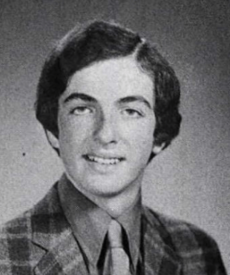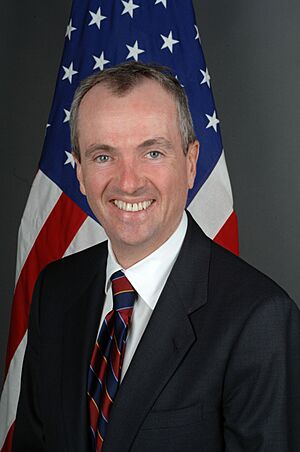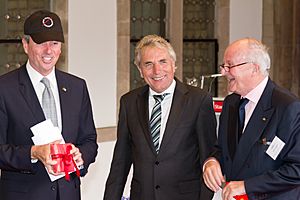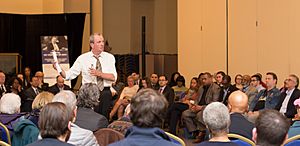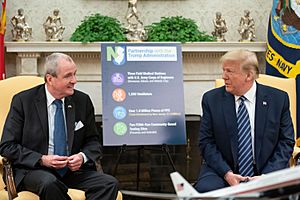Phil Murphy facts for kids
Quick facts for kids
Phil Murphy
|
|
|---|---|
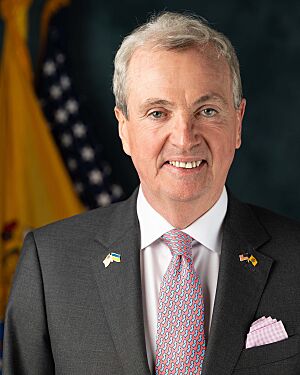
Official portrait, c. 2023
|
|
| 56th Governor of New Jersey | |
| Assumed office January 16, 2018 |
|
| Lieutenant | Sheila Oliver Tahesha Way |
| Preceded by | Chris Christie |
| Chair of the National Governors Association | |
| In office July 15, 2022 – July 14, 2023 |
|
| Preceded by | Asa Hutchinson |
| Succeeded by | Spencer Cox |
| United States Ambassador to Germany | |
| In office September 3, 2009 – August 26, 2013 |
|
| President | Barack Obama |
| Preceded by | William R. Timken |
| Succeeded by | John B. Emerson |
| Personal details | |
| Born |
Philip Dunton Murphy
August 16, 1957 Boston, Massachusetts, U.S. |
| Political party | Democratic |
| Spouse |
Tammy Snyder
(m. 1993) |
| Children | 4 |
| Education | |
Philip Dunton Murphy (born August 16, 1957) is an American politician and former diplomat. Since 2018, he has served as the 56th governor of New Jersey. He is a member of the Democratic Party. Murphy was first elected governor in 2017 and won reelection in 2021. Before becoming governor, he was the U.S. ambassador to Germany from 2009 to 2013.
Murphy grew up in Massachusetts and earned degrees from Harvard University and the University of Pennsylvania. He worked for 23 years at a company called Goldman Sachs, where he held important jobs. After retiring in 2006, he became active in politics. He was in charge of fundraising for the Democratic National Committee for a few years.
Before running for governor, Murphy and his wife, Tammy Murphy, started an organization called New Start New Jersey. In the 2017 election, he won against Republican Kim Guadagno. He was reelected in 2021, becoming the first Democratic governor of New Jersey to win a second term since 1977.
..... He also made it easier for people to register to vote. During the COVID-19 pandemic, he put in place health rules to keep people safe.
Contents
Growing Up and School
Phil Murphy was born on August 16, 1957, in Boston, Massachusetts. He grew up in nearby towns called Needham and Newton. His parents were Dorothy Louise and Walter F. Murphy.
His family was Irish American. Murphy has said his family was "middle class on a good day." His mother worked as a secretary, and his father, who didn't finish high school, took many different jobs. They often lived paycheck to paycheck.
Both of his parents were big fans of John F. Kennedy and helped with his political campaigns. Murphy played soccer when he was young, and he still loves the sport. His mother believed that education was very important. Phil and his three older brothers and sisters all went to college.
Murphy graduated from Needham High School in 1975. He then went to Harvard University, graduating in 1979 with a degree in economics. At Harvard, he hoped to become a musical theater performer. He was even elected president of a student theater group. Later, he went to the University of Pennsylvania's Wharton School, where he earned a business degree in 1983.
Career in Finance
Murphy started his career in finance at Goldman Sachs in 1982. He was hired after he graduated in 1983. He quickly moved up in the company. He said his success came from his ability to help people make deals.
From 1993 to 1997, Murphy led the company's office in Frankfurt, Germany. His work later included Germany, Switzerland, Austria, and other countries in Central Europe. He worked on many deals with the German government.
From 1997 to 1999, Murphy was the President of Goldman Sachs (Asia), working from Hong Kong. In 1999, he joined the firm's management committee. He retired from Goldman Sachs in 2006, after working there for 23 years.
Early Political Work
Helping New Jersey with Benefits
In May 2005, Governor Richard Codey asked Murphy to lead a group called the New Jersey Benefits Task Force. This group looked at benefits for public workers because of a problem with the state's pension system. The pension system helps retired workers get paid.
The task force shared its findings in December 2005. Murphy's group suggested selling some state-owned properties. They also suggested raising the retirement age and changing how pensions were calculated. Labor unions did not like these ideas.
Working for the Democratic Party
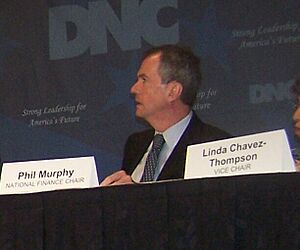
After leaving Goldman Sachs, Murphy worked for the Democratic National Committee (DNC) from 2006 to 2009. He was the National Finance Chair, working with DNC Chair Howard Dean. Murphy and Dean became good friends.
Murphy helped raise a lot of money for the DNC, about $300 million. He also gave almost $1.5 million of his own money to Democratic candidates by 2009.
Becoming an Ambassador
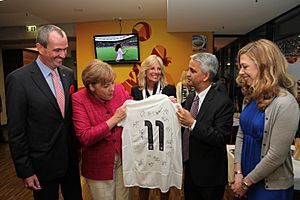
Phil Murphy served as the United States Ambassador to Germany under President Barack Obama from 2009 to 2013. President Obama officially nominated him for the job on July 9, 2009. The United States Senate approved his nomination on August 7. Murphy arrived in Berlin with his family on August 21. He officially started his role on September 3.
There was a time when some secret U.S. diplomatic messages were leaked. These messages included some negative comments Murphy had signed about German politicians. Some German officials wanted Murphy to be removed from his job. Murphy apologized for the leak and said that the two countries worked through it. He felt that the relationship between Germany and the United States became even stronger afterward.
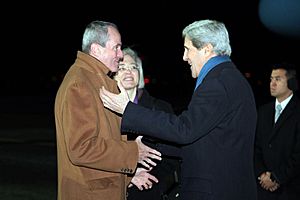
Murphy left his ambassador role on August 26, 2013.
After Being an Ambassador
After his time as ambassador, Murphy was thought of as a possible candidate for governor of New Jersey in 2013, but he did not run. Instead, he rejoined his business consulting firm, Murphy Endeavors LLC. He also gave speeches about his experiences in Germany.
In 2014, Murphy started New Start New Jersey, a non-profit group that focused on progressive policies. His wife was a co-founder and leader of this group. The organization helped raise Murphy's public profile. One of its goals was to help people who had lost their jobs find new work.
In September 2015, Murphy launched another group called New Way for New Jersey. This group was more directly involved in politics. It held town halls and encouraged people to sign petitions criticizing then-Governor Chris Christie. After Murphy announced he was running for governor, New Way for New Jersey stopped its activities.
Running for Governor in 2017
In May 2016, Phil Murphy announced he would run for the Democratic nomination for governor of New Jersey. He was the first person to announce his candidacy. He said he was running because New Jersey needed "adult leadership that puts our people first."
Starting his campaign so early was unusual. He also had to deal with comparisons to a former governor, Jon Corzine, who was also a wealthy former Goldman Sachs executive and was not very popular. Murphy was not well-known at first.
Several other strong candidates were expected to run. However, Steven Fulop, the mayor of Jersey City, and Stephen M. Sweeney, the State Senate President, both decided not to run and endorsed Murphy. This made Murphy the clear front-runner for the nomination.
In January 2017, New Jersey's two U.S. senators, Bob Menendez and Cory Booker, endorsed Murphy. He also received support from all 21 county Democratic party organizations. These endorsements are very important in New Jersey politics.
Murphy spent the most money of all the candidates, using a lot of his own funds. He also donated money to county party organizations. He received endorsements from former Vice President Joe Biden and former Vice President Al Gore. Many major labor unions in the state also supported him.
Murphy won the Democratic primary election on June 6 with 48% of the vote. He then faced Kim Guadagno, the Republican nominee, in the general election in November. Guadagno tried to distance herself from the unpopular Governor Christie and focused on Murphy's background at Goldman Sachs.
On July 26, Murphy announced that Assemblywoman Sheila Oliver would be his running mate.
Murphy won the general election with about 56% of the vote. He became the first Democrat to win the governorship by such a margin in many years.
Murphy's campaign promised several policy changes:
- State Bank: He suggested creating a state-owned bank to help New Jersey's economy. This bank would offer loans to businesses and college students.
- Pensions: He said the state needed to keep its promise to public workers regarding their retirement pensions.
- Minimum Wage: He supported raising the $15 minimum wage and guaranteed paid sick leave.
- Affordable Housing: He proposed ways to create more affordable housing without building too many new buildings.
- School Desegregation: Members of his team later filed a lawsuit to address school segregation.
As Governor
First Term Actions
On January 16, 2018, Phil Murphy became the 56th governor of New Jersey. One of his first actions was to support wind power in the state. The next month, he signed a law committing New Jersey to the Paris Agreement, an international agreement on climate change. Murphy also made sure the state sued the U.S. Environmental Protection Agency for changing a clean water rule.
In March 2018, he signed a law that automatically registers people to vote when they apply for a driver's license or state ID. By June, he had signed a law allowing sports betting in the state. In December, he signed new laws to improve how NJ Transit, the state's public transportation system, is managed.
In April 2019, Murphy signed a law allowing terminally ill patients to choose to end their lives with a doctor's help. ..... In June, Murphy signed a law limiting the use of solitary confinement in New Jersey prisons. In October, he said he was against building a new power plant in North Bergen.
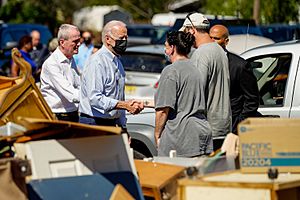
In 2020, the COVID-19 pandemic was a major focus for Governor Murphy. He declared a state of emergency in March and ordered a lockdown of the state. Most schools and businesses closed, and students learned from home. By summer, he had reopened most restaurants but required people to wear masks.
..... In June, he ended the COVID public health emergency but kept some rules in place. After his reelection in November, Murphy said he wanted all children back in school by winter.
Winning Reelection in 2021
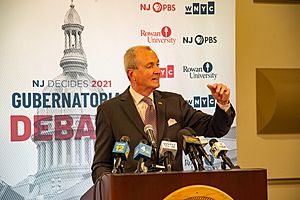
On October 1, 2020, Murphy announced he would run for reelection with Sheila Oliver as his running mate. He ran unopposed in the Democratic primary. He won against Republican Jack Ciattarelli in the general election. The race was much closer than in 2017. Murphy became the first Democratic governor of New Jersey to be reelected since Brendan Byrne in 1977.
Second Term Actions
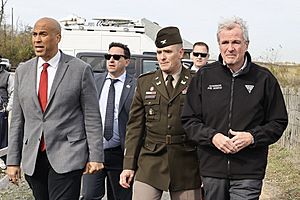
In July 2022, Murphy was chosen to be the chair of the National Governors Association. He was the first person from New Jersey to hold this position.
In April 2023, Murphy helped resolve a strike at Rutgers University. He invited union representatives and university leaders to his office to negotiate, and the strike ended after five days. Murphy also signed an order to protect patients and healthcare workers who provide or receive gender-affirming care in New Jersey.
In July 2023, Murphy filed a lawsuit against the U.S. Department of Transportation. He was trying to stop New York's plan to charge drivers for entering busy parts of Manhattan. He argued that this "congestion pricing" plan needed a full environmental review. Environmental groups criticized Murphy, saying he claimed to be an environmentalist but was trying to stop a plan that would reduce pollution. In January 2025, Murphy asked President Donald Trump to help him stop the plan. In February 2025, the Trump administration ended the plan. New York Governor Kathy Hochul criticized Murphy for this.
From July 28 to August 13, 2023, Murphy was on vacation. During this time, Lieutenant Governor Sheila Oliver became acting governor. Sadly, Oliver passed away on August 1. New Jersey Senate President Nicholas Scutari served as acting governor until Murphy returned. On September 8, Murphy appointed Secretary of State Tahesha Way as the new lieutenant governor.
After U.S. Senator Bob Menendez resigned on August 20, 2024, Murphy appointed George Helmy to finish Menendez's term. In November, Representative Andy Kim was elected to replace Menendez, and Helmy resigned so Kim could take the seat.
In December 2024, Murphy signed a bill that stops book bans in New Jersey.
Personal Life
Phil Murphy met his wife, Tammy Snyder, in 1987 when they both worked at Goldman Sachs. They started dating six years later, got engaged 18 days after their first date, and married in 1993. After U.S. Senator Bob Menendez resigned in August 2024, Tammy tried to get his Senate seat but was not successful.
Murphy and his wife have four children. They moved to Middletown Township, New Jersey, in the late 1990s. They live in a large home by a river. Murphy also owns homes in Germany and Italy. Their children went to schools like Rumson Country Day School and Phillips Academy. Tammy Snyder Murphy has also held various jobs in finance and community work.
Murphy and his wife are part owners of Gotham FC, a professional women's soccer team. Murphy is Roman Catholic.
On March 4, 2020, Murphy had surgery to remove cancerous tumors from his kidneys. He made a full recovery soon after.
In 2015, Murphy received an honorary degree from Hamilton College. In 2019, he received another honorary degree from Rutgers University. In 2022, he was given a special award from Germany called the Knight Commander's Cross of the Order of Merit of the Federal Republic of Germany.
Wealth and Giving Back
Murphy became very wealthy from his time at Goldman Sachs. By one estimate in 2009, his wealth was in the hundreds of millions of dollars after he left the company.
In 2016, Murphy shared his tax returns for five years. In 2014, he earned about $6 million and paid about $2 million in taxes. He also donated a lot of his income to charity. Over those five years, he donated about $980,000 each year to charities.
Community Involvement
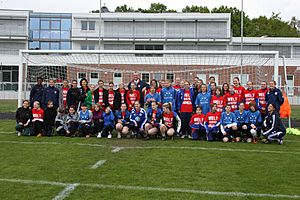
Murphy has been part of many community and charity groups. These include the NAACP, the Local Initiatives Support Corporation, and programs at the University of Pennsylvania. He has also been the grand marshal of the St. Patrick's Day Parade in Rumson, New Jersey, several times.
Murphy and his wife have helped local charities that support troubled teenagers and survivors of domestic abuse. They started a teen helpline in New Jersey called 2nd Floor, which has helped many young people.
From 2004 to 2005, Murphy helped lead a national group focused on public education for the Center for American Progress. This group suggested ideas like longer school days and extending learning to younger children and those beyond high school.
The Murphy family became big soccer fans while living in Germany. Murphy has served on the boards of the U.S. Soccer Foundation and the U.S. Soccer Federation World Cup Bid Committee. He and his wife co-own a part of the professional women's soccer team Gotham FC. He has said he wants to show his daughter that women's professional soccer can succeed in the United States.
Election Results
| Party | Candidate | Votes | % | |
|---|---|---|---|---|
| Democratic | Phil Murphy | 243,643 | 48.37 | |
| Democratic | Jim Johnson | 110,250 | 21.89 | |
| Democratic | John S. Wisniewski | 108,532 | 21.55 | |
| Democratic | Raymond J. Lesniak | 24,318 | 4.83 | |
| Democratic | William Brennan | 11,263 | 2.24 | |
| Democratic | Mark Zinna | 5,213 | 1.03 | |
| Democratic | Write-In | 463 | 0.09 | |
| Total votes | 503,682 | 100 | ||
| New Jersey gubernatorial election, 2017 | |||||
|---|---|---|---|---|---|
| Party | Candidate | Votes | % | ±% | |
| Democratic | Phil Murphy | 1,203,110 | 56.03 | +17.84% | |
| Republican | Kim Guadagno | 899,583 | 41.89 | –18.41% | |
| Reduce Property Taxes | Gina Genovese | 12,294 | 0.57 | N/A | |
| Libertarian | Peter J. Rohrman | 10,531 | 0.49 | –0.08% | |
| Green | Seth Kaper-Dale | 10,053 | 0.47 | +0.08% | |
| Constitution | Matthew Riccardi | 6,864 | 0.32 | N/A | |
| We The People | Vincent Ross | 4,980 | 0.23 | N/A | |
| Total votes | 2,147,415 | 100.00 | |||
| Democrat gain from Republican | Swing | +17.8 | |||
| New Jersey gubernatorial election, 2021 | |||||
|---|---|---|---|---|---|
| Party | Candidate | Votes | % | ±% | |
| Democratic | Phil Murphy (incumbent) | 1,339,471 | 51.22 | -4.81% | |
| Republican | Jack Ciattarelli | 1,255,185 | 48.00 | +6.11% | |
| Green | Madelyn R. Hoffman | 8,450 | 0.32 | -0.15% | |
| Libertarian | Gregg Mele | 7,768 | 0.30 | -0.19% | |
| Socialist Workers | Joanne Kuniansky | 4,012 | 0.15 | N/A | |
| Total votes | 2,614,886 | 100.00 | N/A | ||
| Democrat hold | Swing | -5.78 | |||
See also
 In Spanish: Phil Murphy para niños
In Spanish: Phil Murphy para niños
 | Charles R. Drew |
 | Benjamin Banneker |
 | Jane C. Wright |
 | Roger Arliner Young |


